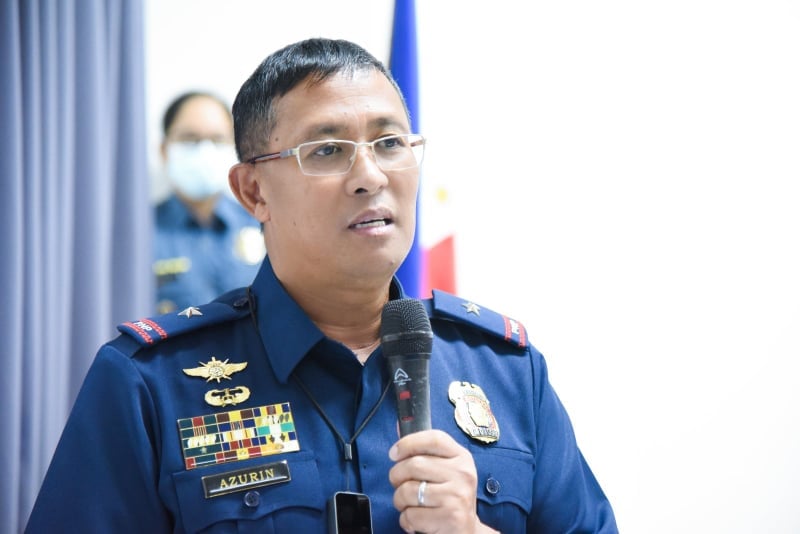
FILE PHOTO: PNP chief Lt. Gen. Rodolfo Azurin Jr. Photo Courtesy of Police Regional Office 1/Facebook Page
MANILA, Philippines — The newly installed chief of the Philippine National Police wants an audit of the deployment of police officers on the field, as it boggles his mind why they are still conducting anti-narcotics operations in areas already declared “drug-free.”
Police Lt. Gen. Rodolfo Azurin Jr. wondered, for instance, why law enforcers were still ordered to operate recently against drug suspects in the municipality of Adams, Ilocos Norte, when supposedly it had already been swept clean of drug users and pushers.
Adams, the smallest town in President Ferdinand Marcos Jr.’s home province, was categorized as drug-free in March 2018, two years after then President Rodrigo Duterte launched his war on illegal drugs, which killed thousands of suspects and prompted the filing of cases accusing him and his subordinates of crimes against humanity in the International Criminal Court.
In his speech during the command turnover ceremony at Camp Crame, Quezon City, on Wednesday, August 3, Azurin said he would order a review of the requirements to deploy police units on the field, saying compliance rates reported by lower units were apparently “no longer applicable in some areas.”
Under Duterte, the Dangerous Drugs Board (DDB) classified barangays as either low or high priority in determining whether they would be subjected to “clearing operations” by the PNP or the Philippine Drug Enforcement Agency (PDEA).
For a barangay to be considered cleared of drugs, there should be a total absence of drug dens or laboratories, as well as zero drug users, pushers, dependents, protectors and financiers, among others, according to DDB Board Resolution No. 4, Series of 2021.
READ: Days before Duterte admin leaves, over 25K barangays cleared, 10K still drug-infested
The village must also have an active Barangay Anti-Drug Abuse Council, which implements programs on drug awareness, preventive education and information, and processing desks for voluntary and compulsory drug treatment and rehabilitation.
Barangays that meet these requirements are declared “drug-cleared.”
They will only be certified “drug-free” once they consistently show zero illegal drug incidents on record.
Drug-cleared and drug-free barangays are supposed to undergo vetting by the Regional Oversight Committee on Barangay Drug Clearing, with the PDEA regional director sitting as its chair.
60-percent cleared
Based on PDEA data, a total of 25,361 barangays in the country, or 60 percent of the total, have been categorized as drug-cleared as of June. On the other hand, 6,573 barangays, comprising 15.6 percent of the total, were either drug-free or “drug-unaffected,” which means the barangay has never been beset by any illegal drug activity.
Interior Secretary Benhur Abalos earlier said the Marcos administration would continue the war on drugs, but he did not answer directly when asked if it would be as violent as Duterte’s, only that it would be done “relentlessly on the basis of the Constitution.”
In his speech on Wednesday, Azurin made a similar pledge.
“I emphasize that our war on drugs shall be relentlessly continued—regardless of who gets hurt and who gets caught,” he said.Azurin said the PNP would conduct an audit of the drug situation in the country, “focusing on the areas where known drug personalities were killed.”
READ: 131 drug-cleared, 2 drug-free brgys in CV retain their status
Official government data showed that a total of 6,252 people were killed in what were counted as legitimate drug operations from July 1, 2016, to May 31, 2022, spanning almost the entirety of Duterte’s term.
Anti-insurgency
Over the same period, a total of 345,216 people were arrested, of whom 15,271, or 4 percent, were considered “high-value targets.”
Azurin said the PNP would partner with other government agencies to ensure that the drug supply chain in the country “would be reduced, if not cut totally.”
On Wednesday, the new PNP chief also posed questions as to why police officers were still being required to conduct “major and minor combat [anti-insurgency] operations” in places already declared cleared of rebel forces.
“Thus, I am directing the QUAD (referring to the PNP’s operations, intelligence, investigation and community relations units) to come up with a more sustainable concept of operations, especially on our war on drugs, local communist terrorists, terrorism, human trafficking, kidnap for ransom and other crimes perpetrated by organized crime groups,” he said.
Before becoming the 28th PNP chief, Azurin headed the Northern Luzon Police Area, composed of the regions of Ilocos, Cagayan Valley, Central Luzon and the Cordillera Administrative Region.
His tour of duty will last for more than a year, ending when he reaches the mandatory retirement age of 56 on August 24, 2023. A graduate of the Philippine Military Academy, Azurin is a member of the “Makatao” Class of 1989.